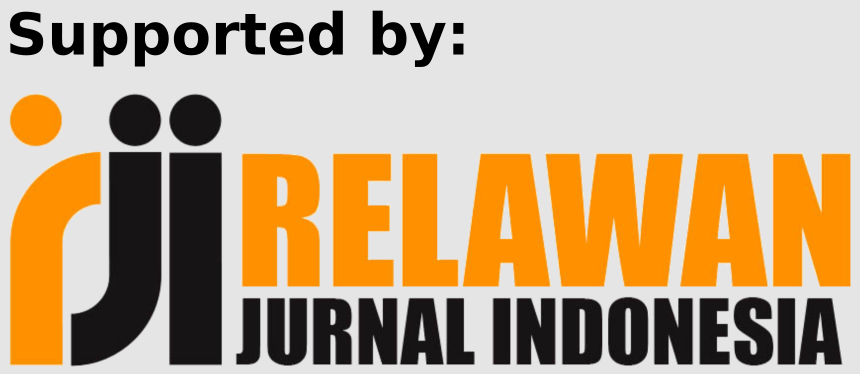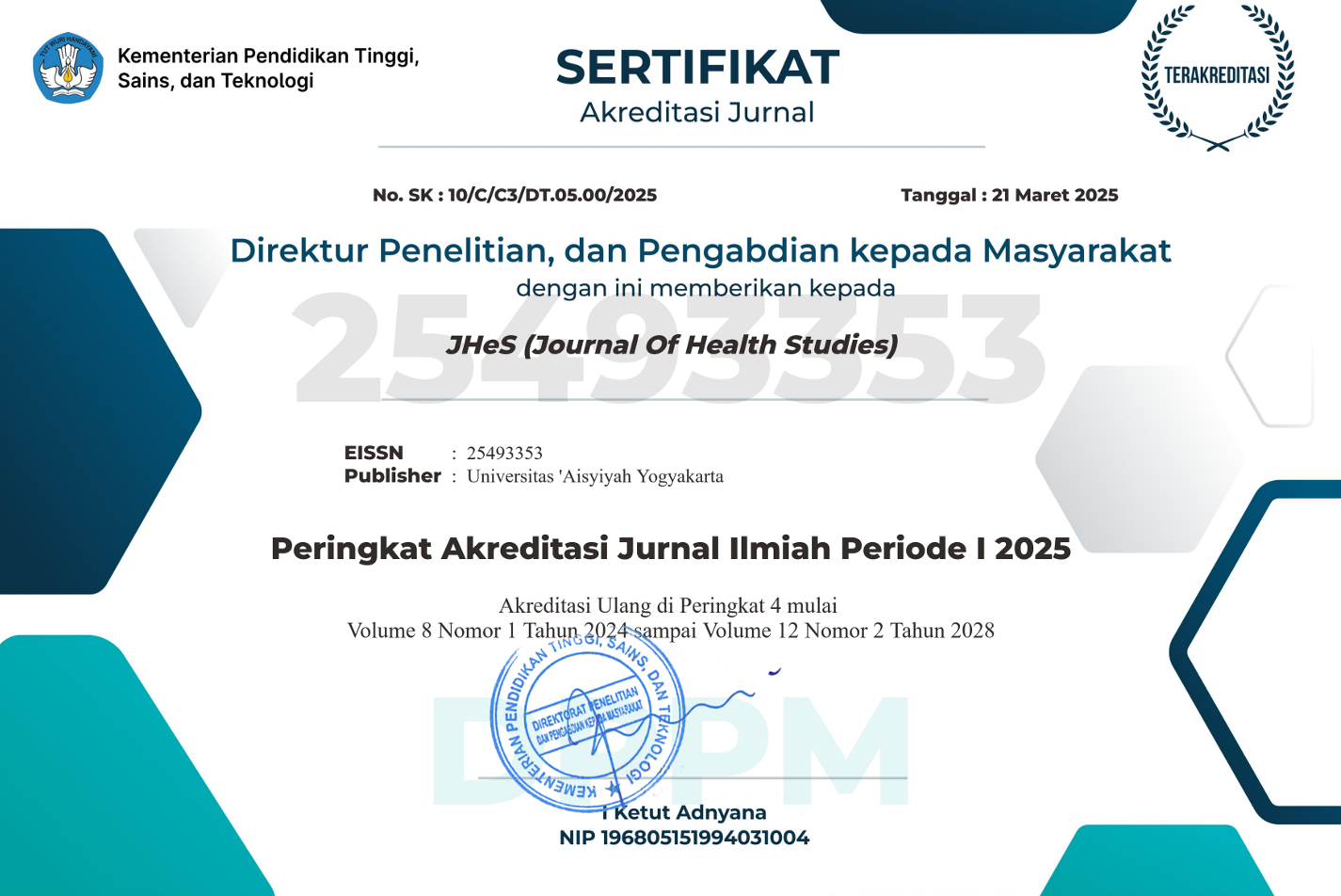Paper and mobile-based education to improve knowledge and self-efficacy on exclusive breastfeeding
DOI:
https://doi.org/10.31101/jhes.4030Abstract views 199 times
Keywords:
breastfeeding, breastfeeding self-efficacy, knowledge, mobile-based education, paper-based educationAbstract
Downloads
References
Adam, M., Johnston, J., Job, N., Dronavalli, M., Le Roux, I., Mbewu, N., Mkunqwana, N., Tomlinson, M., Mcmahon, S. A., Lefevre, A. E., Vandormael, A., Kuhnert, K., Suri, P., Gates, J., Mabaso, B., Porwal, A., Prober, C., & Barnighausen, T. (2021). Evaluation of a community-based mobile video breastfeeding intervention in Khayelitsha , South Africa : The Philani MOVIE cluster-randomized controlled trial. PLoS Medicine, 18(9), e1003744. https://doi.org/10.1371/journal.pmed.1003744
Bahorski, J. S., Childs, G. D., Loan, L. A., Azuero, A., Morrison, S. A., Chandler-laney, P. C., Hodges, E. A., & Rice, M. H. (2019). Self-efficacy, infant feeding practices, and infant weight gain: An integrative review. J Clin Health Care, 23(2), 286–310. https://doi.org/10.1177/1367493518788466
Basu, S., Garg, S., Sharma, A., Arora, E., & Singh, M. (2020). The hindi version of the breastfeeding self-efficacy scale-short form: Reliability and validity assessment. Indian Journal of Community Medicine, 45(3), 348–352. https://doi.org/10.4103/ijcm.IJCM-378-19
Chipojola, R., Chiu, H. Y., Huda, M. H., Lin, Y. M., & Kuo, S. Y. (2020). Effectiveness of theory-based educational interventions on breastfeeding self-efficacy and exclusive breastfeeding: A systematic review and meta-analysis. Int J Nurs Stud, 109, 103675. https://doi.org/10.1016/j.ijnurstu.2020.103675
Corneille, O., Mierop, A., & Unkelbach, C. (2020). Repetition increases both the perceived truth and fakeness of information: An ecological account. Cognition, 205(April), 104470. https://doi.org/10.1016/j.cognition.2020.104470
Galipeau, R., Baillot, A., Trottier, A., & Lemire, L. (2018). Effectiveness of interventions on breastfeeding self‐efficacy and perceived insufficient milk supply: A systematic review and meta‐analysis. Maternal & Child Nutrition, 14(3). https://doi.org/10.1111/mcn.12607
Hayatiningrum, R., Cahyati, Y., & Februanti, S. (2023). The Effect of Health Education Through Animated Video Media and Leaflets About Breastfeeding Techniques on the Level of Knowledge and Skills of Breastfeeding Mothers. Int J Adv Life Sci Res, 6(3), 38–46.
Hore, F. E. M., Forster, D. A., Shafiei, T., & Mclachlan, H. L. (2022). First ‑ time mothers ’ experiences of receiving proactive telephone ‑ based peer support for breastfeeding in Australia : a qualitative study. Int Breasfeed J, 17(31), 1–10. https://doi.org/10.1186/s13006-022-00476-7
Idris, F. P., & Elvinasari, R. (2020). Pengaruh Media Leaflet Terhadap Pengetahuan Ibu tentang ASI Eksklusif di Wilayah Kerja Puskesmas Tinggimoncong Kabupaten Gowa. Prosiding Seminar Nasional SMIPT 2020 Sinergitas Multidisiplin Ilmu Pengetahuan Dan Teknologi, 3, 88–93. https://jurnal.yapri.ac.id/index.php/semnassmipt/article/view/179
Junaedah. (2020). Hubungan pengetahuan ibu dengan pemberian air susu ibu eksklusif di wilayah kerja Puskesmas Muara Badak. Politeknik Kesehatan Kalimantan Timur.
Li, F., Huang, C., Lin, Q., Xi, Y., Xiang, C., Yong, C., & Deng, J. (2023). Maternal Characteristics, Intention, Self-Efficacy, Perceived Social Support, and Exclusive Breastfeeding Practice: Structural Equation Modeling Approaches. Healthcare, 11, 87. https://doi.org/10.3390/healthcare11010087
Lutenbacher, M., Elkins, T., Dietrich, M. S., & Riggs, A. (2018). The Efficacy of Using Peer Mentors to Improve Maternal and Infant Health Outcomes in Hispanic Families: Findings from a Randomized Clinical Trial. Matern Child Health J, 22(Suppl 1), S92–S104. https://doi.org/10.1007/s10995-018-2532-z
Mercan, Y., & Selcuk, K. T. (2021). Association between postpartum depression level, social support level and breastfeeding attitude and breastfeeding self-efficacy in early postpartum women. PLoS ONE, 16(4 April 2021), 1–12. https://doi.org/10.1371/journal.pone.0249538
Merdikawati, A., & Choiriyah, M. (2019). Breastfeeding Self-Efficacy (BSE): Comparation Between Antenatal and Postpartum Period. Journal of Nursing Science Update (JNSU), 7(1), 105–111. https://doi.org/10.21776/ub.jik.2019.007.01.10
Nilsson, I. M. S., Kronborg, H., Rahbek, K., & Strandberg-Larsen, K. (2020). The significance of early breastfeeding experiences on breastfeeding self-efficacy one week postpartum. Matern Chil Nutr, 16(3). https://doi.org/10.1111/mcn.12986
Rollins, N. C., Bhandari, N., Hajeebhoy, N., Horton, S., Lutter, C. K., Martines, J. C., Piwoz, E. G., Richter, L. M., & Victora, C. G. (2016). Why invest, and what it will take to improve breastfeeding practices? Lancet, 387(10017), 491–504. https://doi.org/10.1016/S0140-6736(15)01044-2
Safitri, V. A., Pangestuti, D. R., & Kartini, A. (2021). Pengaruh Video Edukasi Terhadap Pengetahuan dan Sikap Ibu dalam Pemberian ASI Eksklusif di Puskesmas Bulu Lor 2021. Media Kesehatan Masyarakat Indonesia, 20(5), 342–348. https://doi.org/10.14710/mkmi.20.5.342-348
Sari, D. N. A., & Hanafi, N. (2018). Hubungan breastfeeding self-efficacy dengan motivasi dalam pemberian ASI eksklusif ibu hamil trimester 3 di Puskesmas Umbulharjo Yogyakarta. Riset Informasi Kesehatan, 7(2), 134. https://doi.org/10.30644/rik.v7i2.144
Seyyedi, N., Rahmatnezhad, L., Mesgarzadeh, M., Khalkhali, H., Seyyedi, N., & Rahimi, B. (2021). Effectiveness of a smartphone-based educational intervention to improve breastfeeding. Int Breastfeed J, 16(70), 1–8. https://doi.org/10.1186/s13006-021-00417-w
Shafaei, F. S., Mirghafourvand, M., & Havizari, S. (2020). The effect of prenatal counseling on breastfeeding self-efficacy and frequency of breastfeeding problems in mothers with previous unsuccessful breastfeeding: A randomized controlled clinical trial. BMC Women’s Health, 20(1). https://doi.org/10.1186/s12905-020-00947-1
Unicef. (2022). Pekan Menyusui Sedunia: UNICEF dan WHO serukan dukungan yang lebih besar terhadap pemberian ASI di Indonesia seiring penurunan tingkat menyusui selama pandemi COVID-19.
Uzunçakmak, T., Gökşin, İ., & Ayaz-Alkaya, S. (2022). The effect of social media-based support on breastfeeding self-efficacy: a randomised controlled trial. Eur J Contracept Reprod Health Care, 27(2), 159–165. https://doi.org/10.1080/13625187.2021.1946500
Vakilian, K., Farahani, O. C. T., & Heidari, T. (2020). Enhancing Breastfeeding – Home‑Based Education on Self‑Efficacy: A Preventive Strategy. Int J Prev Med, 11(63), 1–5. https://doi.org/10.4103/ijpvm.IJPVM_494_17
Downloads
Published
Issue
Section
License
Copyright (c) 2025 JHeS (Journal of Health Studies)

This work is licensed under a Creative Commons Attribution-ShareAlike 4.0 International License.
With the receipt of the article by the Journal of Health Studies Editorial Board and the decision to be published, then the copyright regarding the article will be diverted to Journal of Health Studies. Universitas 'Aisyiyah Yogyakarta as the publisher of Journal of Health Studies hold the copyright regarding all the published articles in this journal.
Journal of Health Studies is licensed under a Creative Commons Attribution-ShareAlike 4.0 International License.













